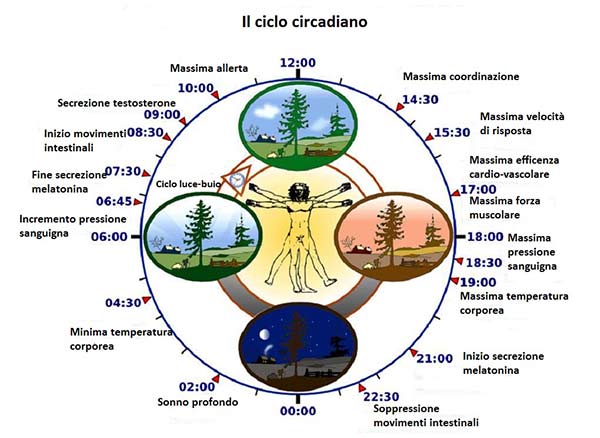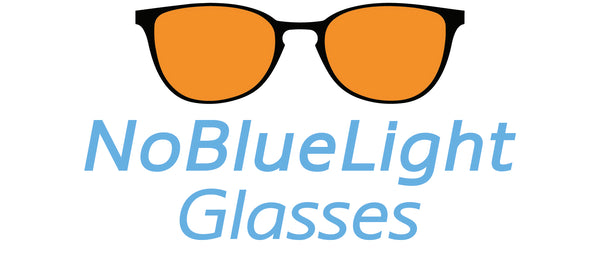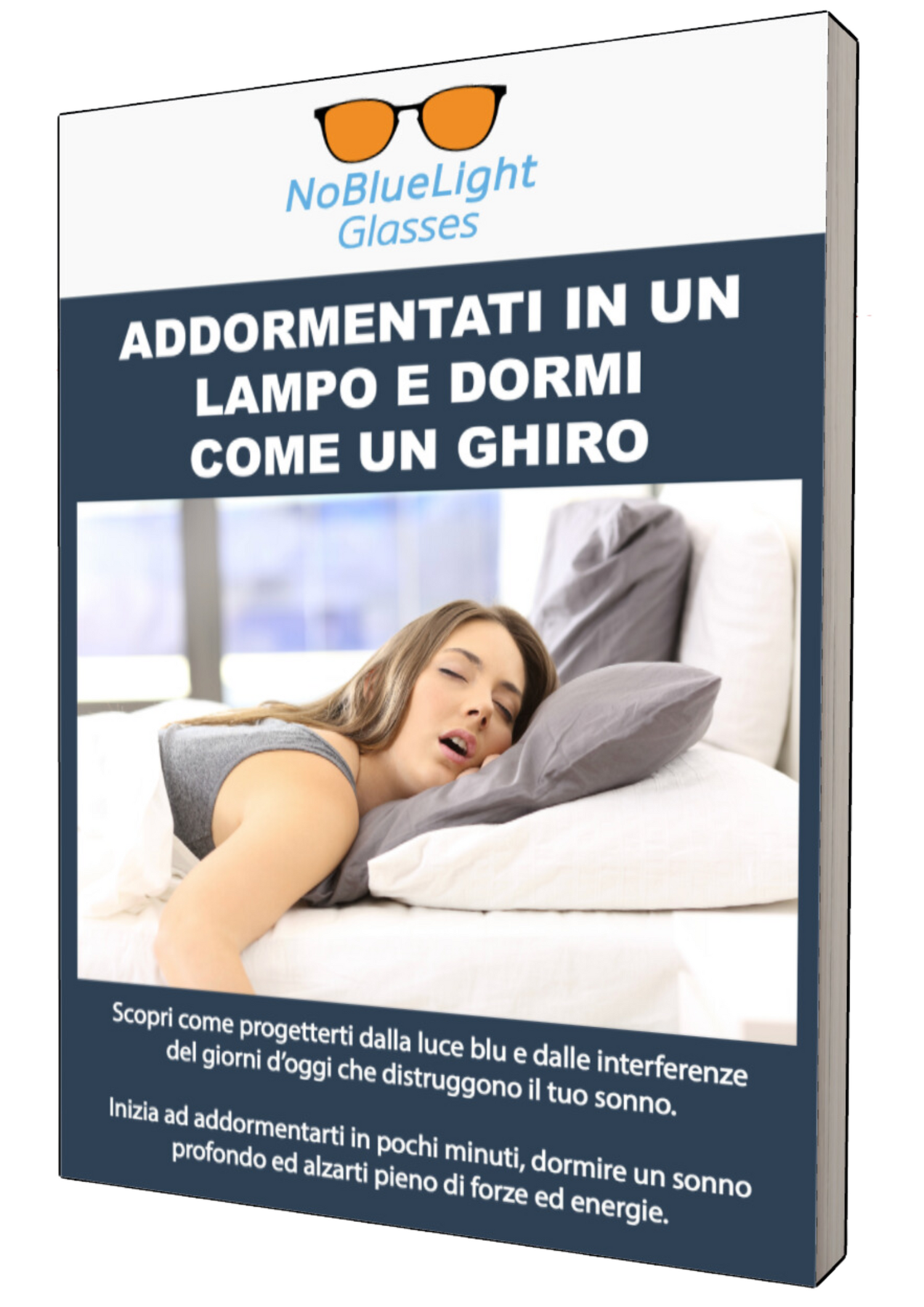
Cuodian rhythm: what is, how influences our life, our sleep and our well -being ?
Share
The circadian rhythm, also known as the “biological clock”, is an internal cycle in our body that regulates many vital functions.
In this article, we’ll explore what the circadian rhythm is, how it works, and why protecting it is essential to our well-being.
Finally, we will see how most of us have a disrupted circadian rhythm due to exposure to blue light emitted by smartphone screens, TVs, PCs and electronic devices in general and what this means for our health.
First of all… what exactly is the circadian rhythm?

The circadian rhythm is a natural cycle of approximately 24 hours that influences a wide range of biological processes.
It regulates sleep, wakefulness, body temperature, hormone production, and even digestion.
The circadian rhythm is regulated by the light-dark cycle that we have followed for thousands of years, namely from the simple alternation of the light of the sun and the darkness of the night.
When working properly, the circadian rhythm helps us feel awake and alert during the day and relaxed and ready for sleep at night.
However, modern lifestyle has altered this balance, with negative effects on our health, particularly on our sleep.
Before seeing how this influence occurs, let's see how the circadian rhythm is regulated.
How does the circadian rhythm work?

The circadian rhythm is regulated by an area of the brain called the suprachiasmatic nucleus, located in the hypothalamus.
This “biological clock” receives signals from the light that enters through our eyes.
Here's how it works:
During the day, Exposure to sunlight sends the message to your brain that it's time to get active.
The production of melatonin (the hormone that promotes sleep) is blocked and the body prepares itself to face the day.
As evening falls and the sunlight decreases, our eyes communicate this signal to our brain.
This starts the production of melatonin, which allows us to fall asleep within minutes and have a deep, restful sleep.
The problem nowadays?
We are constantly exposed to artificial light sources, especially the blue light emitted by screens and LED bulbs in the evening.

This can disrupt our circadian rhythm and prevent us from sleeping well.
Until a few decades ago, the absence of blue light in the evening communicated to our brain that it was time to sleep.
This then produced melatonin, the sleep hormone, which would make us fall asleep within moments of going to bed and which would make us sleep a deep and restful sleep.
Why is circadian rhythm important and today's disrupted rhythm dangerous?

A well-balanced circadian rhythm is essential for our health.
When our internal biological clock is functioning properly, we wake up refreshed, have energy during the day, and sleep soundly at night.
Conversely, a disturbed circadian rhythm can lead to:
• Sleep disturbances: difficulty falling asleep or sleep that is not very restorative;
• Low Energy: feeling tired and unproductive during the day;
• Health problems: An altered circadian rhythm has been linked to obesity, diabetes, and cardiovascular disease.
Protecting our circadian rhythm is not just about sleeping better, but about taking care of our productivity, our mood and our long-term health..
Blue light and the circadian rhythm

We have seen that throughout the day, our body is accustomed to following the natural signals of light emitted by the sun.
Today however, the artificial blue light of screens has become a constant presence, especially in the evening!
Smartphones, computers, TVs and even LED light bulbs emit blue light.
This blue light:
• It confuses the brain: blue light sends the signal to our brain that it is daytime, even when it is evening;
• Blocks melatonin production: This means that our body does not receive the signal to relax and prepare for sleep.
How to Rebalance Your Circadian Rhythm: Practical Advice

Given the unnatural environment we live in today, it is necessary to adopt small habits to protect our biological clock, in order to improve our sleep and our health.
Here are some tips you can implement right away to improve your circadian rhythm:
1. Expose yourself to natural light every day
Spend at least 10-20 minutes in the sun during the middle of the day. Natural light is much more intense than artificial light and helps regulate our circadian rhythm.
2. Try to keep a regular sleep schedule
Try to go to sleep and wake up at the same time every day. Maintaining the same schedule strengthens your circadian rhythm.
3. Reduce exposure to blue light in the evening.
Avoid using smartphones, computers and TV at least an hour before going to sleep. If you can't do without them, use the No Blue Light Glasses to block blue light.
The Role of Blue Light Blocking Glasses

Wearing blue light blocking glasses is the most effective solution to protect our circadian rhythm, especially when we spend a lot of time in front of screens in the evening.
In the modern world we live in, most of the people use electronic devices before going to sleep.
These allow us to keep in touch with family, friends or simply to unwind on social networks or watching a movie.
The problem?
Their screens emit huge amounts of blue light that ruins our sleep, our circadian rhythm and our overall health.
This is why blue light blocking glasses like No Blue Light Glasses are a necessary protection nowadays to regulate our circadian rhythm.
Glasses with orange lenses, like those of No Blue Light Glasses, block a large amount of blue light, allowing our body to naturally produce melatonin.
This will relax us and prepare us for sleep.
These glasses are especially useful for those who work on the computer until late, for those who watch TV or for those who use the smartphone before going to sleep.
Only glasses with orange lenses allow you to block a sufficiently high percentage of blue light.
This allows us to optimize our circadian rhythm even if we use electronic devices in the evening.
However, not all glasses with orange lenses block blue light.
In addition to having to be built for this purpose, their lenses they must reflect blue light, not color it.
This can be seen from the intense blue reflection on their lenses.

To recap, these are the tips that will help you if you want to improve your circadian rhythm right away:
• Expose yourself to natural light every day.
• Try to maintain a regular sleep schedule.
• Reduce exposure to blue light in the evening, or continue your routine by wearing a pair of No Blue Light Glasses that will block blue light in the evening.
Hundreds of people have already purchased these glasses but, despite a 60-day money back guarantee, no one has ever asked for a refund!
All the people who have purchased one or more pairs of “No Blue Light Glasses” to date have been satisfied.
All report falling asleep faster and experiencing deep, restful sleep.
Like Sabrina who says:

Or Marcello who says:

Fortunately, there are ways to combat the negative effects of blue light emitted by screens after sunset.
Or rather, it is possible to block this blue light, making our body produce melatonin naturally and avoiding all the damage that blue light can cause to our circadian rhythm.
With “No Blue Light Glasses” you can enjoy today’s technology without disrupting your sleep and circadian rhythm.
Sleep is essential to our health and well-being.
We spend 1/3 of our life sleeping and the other 2/3 are influenced by how we spend the third we sleep…
There is no physiological process that impacts our well-being, health and vitality more than good sleep.
Don't let today's lifestyle rob you of quality rest.
You can try No Blue Light Glasses risk-free for 60 days.
Shipping and any returns are currently free.
If you are not satisfied, you can return them with a refund equal to 100% of the amount paid, with return costs possibly at our expense.


